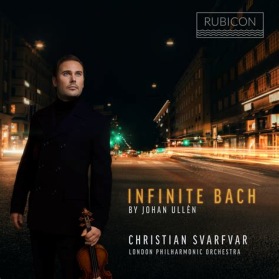Infinite Bach: Bach recomposed
Concerto for Violin, String Orchestra, Harpsichord and Keyboard (2014)
Duration: ca 60 minutes
Teaservideo from the recording sessions at Abbey Road Studios, London.
Performers:
Christian Svarfvar, violin
London Philharmonic Orchestra
Johan Ullén, harpsichord/keyboard
The album Infinite Bach is available now!
In the beginning of 2020, we recorded Infinite Bach (formerly named ReBach) with soloist Christian Svarfvar together with the London Philharmonic Orchestra, at the classic Abbey Road Studios in London. The album was released in December of 2021 on the English label Rubicon.
It is available at all music streaming platforms, such as Spotify and Apple Music.
Publisher
Infinite Bach is published by Gehrmans
Commentary
(Four?!? Yes. First, the two classical ones, the Concertos in E major and A minor, then two of the concertos that have been reconstructed from Bach's piano concertos, them actually being Bach's adaptions of his own violin concertos, the scores of which are now lost: the Concertos in D minor and G minor. The Violin Concerto in G minor is recognized as the same piece of music as the Piano Concerto in F minor...)
What is it then, this treatment, that I have exposed Bach's Violin Concertos to?
Like Richter, I have used parts of the original score and made loops of it, added new layers to it, turned it, twisted it, and added new harmonies.
Sometimes, as little as eight bars has been chosen as the fundament of an entire movement, sometimes, the music starts off in Bach's original music and then escapes, at times, the music begins with a long flying start that finally ends in the safe embrace of the original score of Bach.
Like Richter, I use repetition, and impregnate the original with a kind of estetics and harmony that emanates from popular music forms - but the result is always rooted in the original music.
The process of choosing what sections to use from Bach's original score was incredibly stimulating. We all have our favourite moments in music that we love: often, I find myself waiting and longing for those blessed moments in longer classical pieces: for instance, the deep C of the horns from the quartet of The Marriage of Figaro, the minimalistic section of Petrouchka where trumpets and trombones play in canon over the manic riff of the full orchestra, the tragic climax of the Wood Dove's Song of Gurre-Lieder, the transition between the Scherzo and the Final of Beethoven's Fifth Symphony, and so forth, just to give some examples of my own preferences.
And as wonderfully ecstatic as they are short, these sweet moments flies past us in the relentless stream of music. Stop! Isn't it possible to rest in that sweetness, to stay for a while and swim in it?
Is it really allowed to abuse music like that...?
Why, yes, of course it is. And that has been my entrance into this project, my basic attitude in working with it, as well as my final goal, with Infinite Bach.





